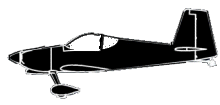
ASN Wikibase Occurrence # 308534
This information is added by users of ASN. Neither ASN nor the Flight Safety Foundation are responsible for the completeness or correctness of this information.
If you feel this information is incomplete or incorrect, you can submit corrected information.
| Date: | Tuesday 9 February 2021 |
| Time: | 15:53 LT |
| Type: |  Van's RV-7 |
| Owner/operator: | Rv770816 LLC |
| Registration: | N611E |
| MSN: | 70816 |
| Year of manufacture: | 2021 |
| Total airframe hrs: | 4 hours |
| Engine model: | Titan IOX-370-J4B3T |
| Fatalities: | Fatalities: 0 / Occupants: 1 |
| Aircraft damage: | Substantial |
| Category: | Accident |
| Location: | Thonotosassa, Florida -
 United States of America United States of America
|
| Phase: | En route |
| Nature: | Test |
| Departure airport: | Tampa Executive Airport, FL (KVDF) |
| Zephyrhills Airport, FL (ZPH/KZPH) | |
| Investigating agency: | NTSB |
| Confidence Rating: |
During the previous flight, the experimental, amateur-built airplane lost total engine power, and the pilot, who was the builder of the airplane, completed a successful forced landing with no damage to the airplane. He found that the fuel pressure adapter 't”-fitting, used to attach the fuel pressure line, had disconnected from the fuel pump elbow fitting. The automotive adapter fitting was adopted during the airplane's construction for fitment in a confined space and did not allow for measured torque application. The pilot reattached the fitting with a modified and shortened 5/8” spanner wrench for the 11/16” b-nut. The pilot departed the forced landing site and landed successfully at his destination.
The accident flight was the airplane's next flight. Minutes after takeoff, the airplane once again experienced a loss of fuel pressure and a total loss of engine power. During the subsequent forced landing, the pilot sustained minor injuries and the airplane was substantially damaged. Post-accident examination of the airplane revealed that the same fuel pump elbow fitting was disconnected from the adapter fitting.
Examination of the adapter revealed that its material was soft relative to materials used in Air Force-Navy (AN) standard fittings. As a result, the shoulder on the adapter body could have been deformed under the pressure of the retaining ring even when applying minimum torque values suggested for AN standard fittings made of aluminum alloys specified in military specification. This deformation may have inhibited the proper frictional resistance in the threads to prevent the nut from backing off in service. Additionally, the body of the adapter fitting tended to rotate when applying torque to the nut. If the body was not properly secured while torque was applied to the nut during field repairs, the twisting of the adapter fitting body could have produced stresses in the attached hoses in the assembly that may have worked to rotate the adapter fitting and nut in the loosening direction during operation.
Probable Cause: The pilot's failure to apply adequate torque on the fuel pressure line aluminum adaptor fitting, which resulted in the loosening of the adapter, a loss of fuel flow, and a total loss of engine power. Contributing to the accident was the pilot's choice of a soft aluminum automotive fitting, and the design, which required hand-tightening with a shortened, modified wrench that prevented a measured torque application.
Accident investigation:
 |
|
Sources:
NTSB ERA21LA127
Location
Revision history:
| Date/time | Contributor | Updates |
|---|
Corrections or additions? ... Edit this accident description
The Aviation Safety Network is an exclusive service provided by:


 ©2024 Flight Safety Foundation
©2024 Flight Safety Foundation